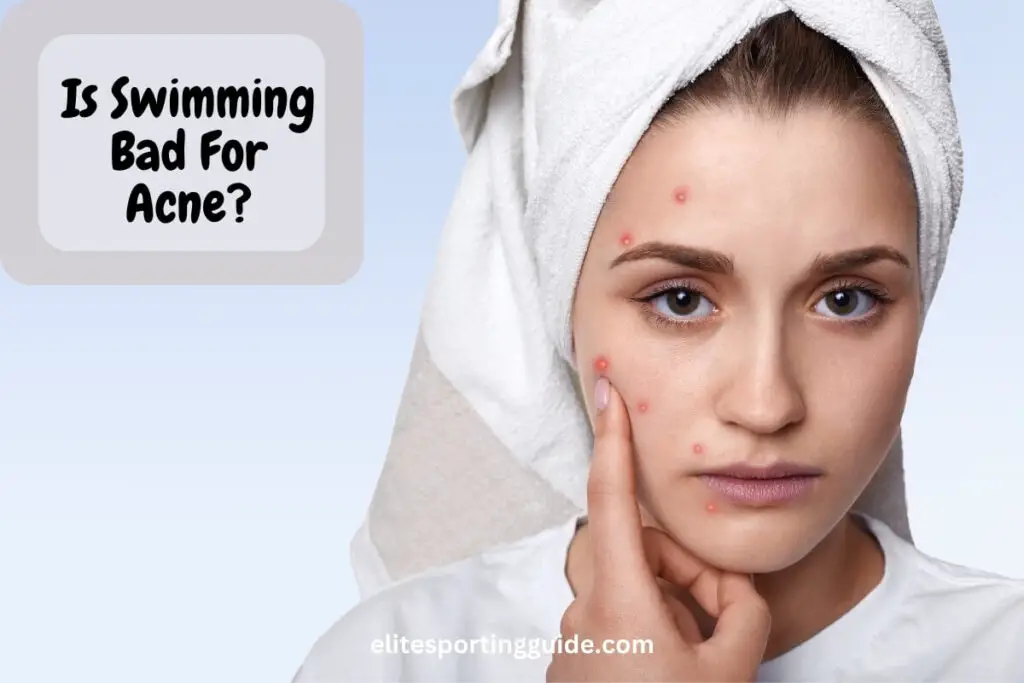This article explores the nuanced relationship between aquatic exercise and skin health.
Tackling common concerns and misconceptions, we delve into the potential impacts of chlorine exposure, water friction, and post-swim skincare practices on acne-prone skin.
By examining the interplay of environmental factors, skincare routines, and individual skin sensitivities, we aim to provide clarity and guidance for those navigating the waters of acne management amidst their love for swimming.
Join us as we dive deep into the science behind acne and swimming, uncovering insights to help you make informed choices for clearer, healthier skin.
Is Swimming Bad For Acne?
Swimming itself isn’t inherently bad for acne, but exposure to chlorine and other pool chemicals, combined with prolonged moisture and friction, can potentially aggravate acne symptoms for some individuals. The effects can vary depending on individual skin sensitivities and the post-swim skincare routine adopted. Proper hygiene practices, such as rinsing off after swimming and using non-comedogenic skincare products, can help mitigate the risks and maintain skin health for avid swimmers with acne-prone skin.
Understanding Acne: Causes and Triggers

Acne, a prevalent skin condition affecting millions worldwide, manifests in various forms such as whiteheads, blackheads, and inflammatory pimples.
While it commonly emerges during adolescence due to hormonal changes, it can persist into adulthood and pose significant challenges to one’s self-esteem and overall well-being.
To effectively manage acne, it’s essential to comprehend its underlying causes and triggers.
1. Role of Sebaceous Glands: Sebaceous glands, present in the skin’s dermal layers, produce an oily substance called sebum.
Sebum plays a major role in maintaining skin hydration and flexibility.
However, overproduction of sebum can lead to clogged pores, a primary factor in acne development.
2. Hormonal Influence: Hormonal fluctuations, particularly during puberty, menstruation, pregnancy, and menopause, significantly contribute to acne flare-ups.
Androgens, including testosterone, stimulate the sebaceous glands to produce more sebum, creating an ideal environment for acne-causing bacteria to thrive.
3. Genetic Predisposition: Genetics also play a role in acne development. Individuals with a family history of acne are more likely to experience it themselves.
Genetic factors can influence sebum production, skin inflammation, and the body’s response to bacteria, contributing to acne severity.
4. External Factors: Environmental and lifestyle factors can exacerbate acne.
Exposure to pollutants, harsh chemicals, and UV radiation can irritate the skin and worsen acne lesions.
Additionally, wearing tight clothing or using pore-clogging skincare products can contribute to pore blockages and acne formation.
5. Dietary Influences: While research on the link between diet and acne is ongoing, certain dietary factors may exacerbate acne in susceptible individuals.
High-glycemic foods, dairy products, and foods rich in saturated fats have been implicated in worsening acne symptoms.
However, the impact of diet on acne varies from person to person, and more studies are needed to establish clear causal relationships.
6. Psychological Factors: Stress and anxiety can cause a flare-up of acne symptoms through various mechanisms.
Stress triggers hormonal changes that stimulate sebum production and inflammation, worsening existing acne lesions.
Additionally, stress may lead to unhealthy coping behaviors such as picking or squeezing acne lesions, which can cause further irritation and scarring.
Understanding the complex interplay of these causes and triggers is essential for developing effective acne management strategies.
The Relationship Between Exercise and Acne
The relationship between exercise and acne is complex and multifaceted, with both positive and negative effects depending on various factors.
While regular exercise offers numerous health benefits, including improved cardiovascular health, mood regulation, and stress reduction, its impact on acne can be influenced by factors such as intensity, duration, and individual skin characteristics.
Exercise promotes circulation and oxygenation of the skin, which can contribute to a healthy complexion by aiding in the removal of toxins and supporting skin cell renewal.
However, certain forms of exercise, particularly high-intensity activities that induce heavy sweating and friction, can exacerbate acne by causing pore blockages and irritation.
Additionally, wearing tight-fitting workout clothing and using occlusive skincare products may trap sweat and bacteria against the skin, leading to breakouts and inflammation.
Proper hygiene practices, such as showering promptly after workouts and using non-comedogenic skincare products, can help mitigate these risks and maintain clear, healthy skin.
Moreover, managing stress levels through exercise can have indirect benefits for acne management, as high stress levels are known to exacerbate acne symptoms through hormonal fluctuations and increased inflammation.
Benefits of Swimming for Skin Health

Swimming offers a range of benefits beyond cardiovascular fitness and muscle strength; it can also positively impact skin health in several ways.
Understanding how swimming affects the skin can shed light on its potential as part of a holistic skincare regimen.
1. Hydration and Moisture Balance: Swimming in water helps hydrate the skin by increasing moisture levels.
Unlike other forms of exercise that may lead to sweating and dehydration, swimming allows the skin to absorb moisture, promoting a more hydrated and supple complexion.
2. Gentle Exfoliation: The movement of water against the skin during swimming acts as a natural exfoliant, helping to slough off dead skin cells and debris.
This gentle exfoliation can promote skin renewal, leaving the skin looking fresher and more radiant.
3. Improved Blood Circulation: Swimming stimulates blood circulation throughout the body, including the skin.
Better blood flow means improved delivery of oxygen and nutrients to the skin cells, as well as more efficient removal of waste products, which can contribute to a healthier, more vibrant complexion.
4. Reduced Stress Levels: Swimming is known for its stress-relieving benefits, thanks to its rhythmic, meditative nature.
Stress reduction can have a positive impact on skin health by lowering levels of stress hormones like cortisol, which are associated with skin issues such as acne, eczema, and psoriasis.
5. Sun Protection: While swimming outdoors exposes the skin to sunlight, many indoor pools are treated with chlorine, which can act as a mild disinfectant and protect the skin from harmful bacteria and infections.
However, prolonged exposure to chlorine can also strip the skin of its natural oils and lead to dryness and irritation, so it’s important to shower and moisturize after swimming in chlorinated water.
6. Enhanced Skin Barrier Function: Regular swimming can help strengthen the skin’s natural barrier function, which plays an imperative role in protecting against environmental aggressors, allergens, and irritants.
A stronger skin barrier is better equipped to retain moisture and fend off external threats, leading to healthier, more resilient skin.
7. Stress Reduction: Swimming is an excellent stress reliever, and reducing stress levels can have a positive impact on skin health.
Lower stress levels can lead to decreased inflammation and a more balanced production of oil, which can help prevent acne breakouts and other skin issues.
8. Improved Mental Well-being: Swimming is not only beneficial for physical health but also for mental well-being.
Potential Risks: Chlorine and Acne
1. Skin Dryness and Irritation: Chlorine is a harsh chemical that can strip the skin of its natural oils, leading to dryness, redness, and irritation.
For individuals with acne-prone skin, this can exacerbate existing breakouts and compromise the skin’s natural barrier function, making it more susceptible to bacterial infections and inflammation.
2. Disruption of the Skin Microbiome: Chlorine exposure can disrupt the delicate balance of bacteria on the skin’s surface, known as the skin microbiome.
A healthy microbiome plays a vital role in protecting the skin against pathogens and maintaining its overall health.
Imbalances in the skin microbiome can contribute to acne flare-ups and other skin disorders.
3. Increased Sensitivity: Acne-prone skin is often more sensitive and reactive to external irritants, including chlorine.
Prolonged exposure to chlorinated water can exacerbate sensitivity, leading to stinging, itching, and inflammation.
This can further aggravate acne symptoms and contribute to discomfort and dissatisfaction with the skin.
4. Post-Swimming Breakouts: Some individuals may experience post-swimming breakouts, characterized by the sudden onset of acne lesions after swimming sessions.
This can be attributed to the combination of chlorine exposure, increased sweat production, and occlusion of pores by swimwear and sunscreen residues, creating an ideal environment for acne-causing bacteria to proliferate.
5. Potential for Chloracne: In rare cases, chronic exposure to high concentrations of chlorine can lead to a specific type of acne known as chloracne.
Chloracne is characterized by the development of persistent, deep-seated acne lesions, particularly around the face, neck, and back.
While uncommon, it underscores the importance of minimizing exposure to excessive levels of chlorine and practicing proper skincare hygiene.
6. Precautionary Measures: To mitigate the risks associated with chlorine exposure, individuals with acne-prone skin can take several precautionary measures:
• Rinse off thoroughly with fresh water before and after swimming to minimize chlorine absorption and remove chlorine residue from the skin.
• Apply a barrier cream or petroleum jelly to create a protective layer on the skin before swimming.
• Shower with a gentle, pH-balanced cleanser immediately after swimming to remove chlorine and sweat from the skin’s surface.
• Moisturize regularly to replenish lost moisture and restore the skin’s natural barrier function.
• Consider swimming in saltwater pools or natural bodies of water, which may be less irritating to the skin compared to chlorinated pools.
Precautions and Skincare Tips for Swimmers
1. Pre-Swim Preparation:
• Shower with lukewarm water and a gentle cleanser before entering the pool. This helps to remove dirt, oils, and skincare products, reducing the amount of chlorine absorbed by the skin.
• Apply a waterproof sunscreen with a high SPF to protect your skin from the sun’s harmful UV rays, especially if swimming outdoors. Choose a sunscreen that is labeled “water-resistant” and reapply every two hours or after swimming.
2. Hydration:
• Drink plenty of water before and after swimming to stay hydrated. Proper hydration helps maintain skin moisture levels and supports overall skin health.
3. Post-Swim Skincare Routine:
• Rinse off immediately after swimming to remove chlorine, saltwater, and pool chemicals from your skin.
Use lukewarm water and a mild, fragrance-free cleanser to avoid further drying or irritating the skin.
• Apply a moisturizer to hydrate and replenish your skin’s moisture barrier.
Look for moisturizers containing ingredients like hyaluronic acid, glycerin, or ceramides to help lock in moisture.
• Consider using a gentle exfoliating scrub or body wash a few times a week to remove chlorine residue and dead skin cells.
Be cautious not to over-exfoliate, as this can cause skin irritation and inflammation.
4. Protective Measures:
• Wear a swim cap to protect your hair from chlorine exposure and prevent it from becoming dry and brittle.
• Use goggles to protect your eyes from irritation caused by chlorine and other pool chemicals.
• Consider wearing a rash guard or swim shirt to provide additional protection from the sun’s UV rays, especially if swimming outdoors for an extended period.
• Apply a thin layer of petroleum jelly or a barrier cream to areas prone to chafing, such as the neck, underarms, and inner thighs, to prevent friction-related irritation.
5. Moisturize and Protect:
• After showering, apply a rich, emollient moisturizer to lock in moisture and soothe dry, irritated skin. Look for products containing ingredients like shea butter, coconut oil, or oat extract.
• Use a broad-spectrum sunscreen with SPF 30 or higher on exposed skin, even on cloudy days or when swimming indoors. Reapply sunscreen every two hours or more frequently if swimming or sweating heavily.
6. Consult a Dermatologist:
• If you experience persistent skin irritation, dryness, or breakouts despite following these precautions, consider consulting a dermatologist for personalized skincare advice and treatment options.
Post you may like: Is Swimming Bad For Eczema?
Balancing Exercise and Skin Care: Expert Recommendations
Balancing exercise and skincare is crucial for maintaining a healthy complexion while staying physically active.
According to experts, a few key strategies can help individuals strike this balance effectively.
First and foremost, it’s essential to cleanse the skin before and after workouts to remove sweat, dirt, and bacteria that can clog pores and lead to breakouts.
Opting for lightweight, non-comedogenic skincare products ensures that the skin can breathe and doesn’t feel weighed down during exercise.
Additionally, wearing breathable, moisture-wicking fabrics and showering immediately after workouts can help minimize skin irritation and bacterial growth.
Experts also emphasize the importance of staying hydrated to support skin hydration and elasticity, especially during intense exercise sessions.
Lastly, incorporating antioxidant-rich foods into one’s diet and using skincare products containing antioxidants can help protect the skin from free radical damage induced by exercise.
Making Informed Choices for Acne Management
In conclusion, making informed choices for acne management is pivotal in achieving clearer, healthier skin.
Understanding the causes and triggers of acne, including hormonal influences, genetic predispositions, and environmental factors, empowers individuals to tailor their skincare routines and lifestyle habits accordingly.
From incorporating gentle cleansers and moisturizers into daily skincare regimens to adopting stress-reduction techniques and seeking professional guidance when needed, proactive management strategies can significantly improve acne symptoms and overall skin health.
Furthermore, being mindful of potential risks, such as chlorine exposure in swimming pools, underscores the importance of taking preventive measures and practicing proper skincare hygiene.
By prioritizing self-care, staying informed about effective treatments, and embracing a holistic approach to acne management, individuals can embark on a journey towards clearer, more confident skin and enhanced well-being.
Ultimately, by making informed choices and committing to consistent skincare practices, individuals can empower themselves to conquer acne and embrace their skin’s natural beauty.
Post you may be interested in: Can Swimming Damage Your Skin?



